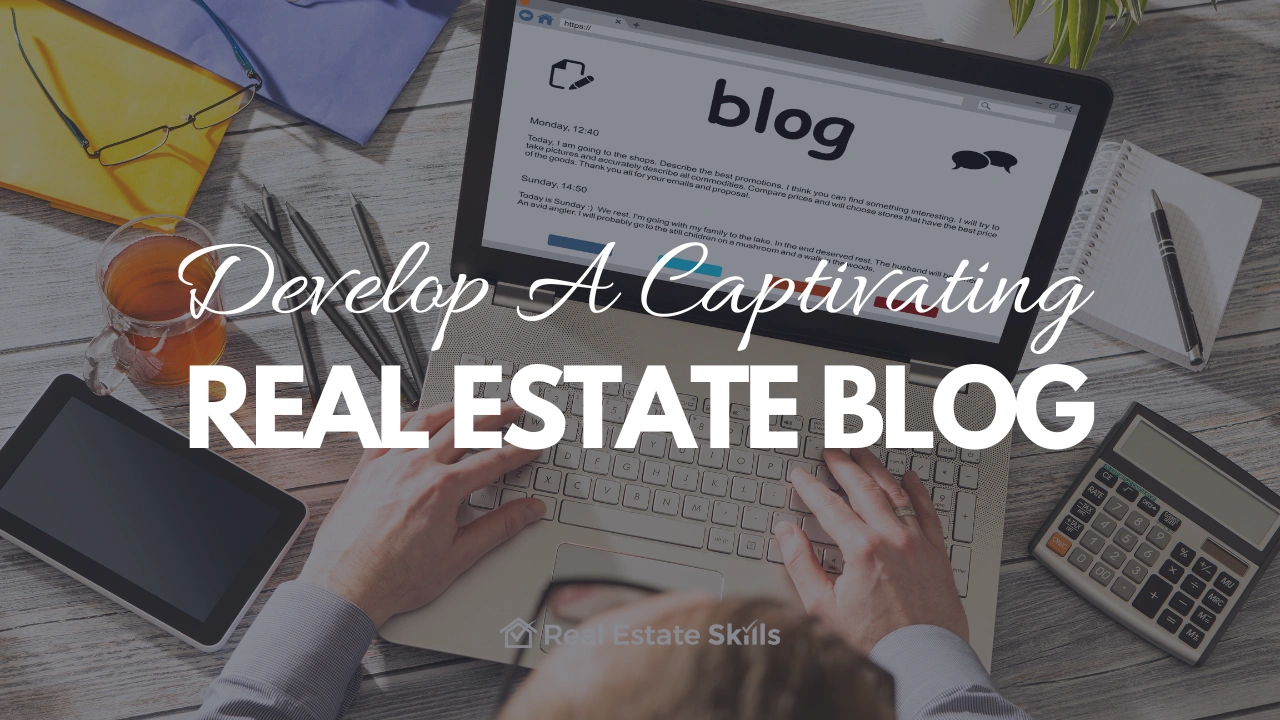
Real Estate Marketing Ideas: The 10 Best Campaign Strategies in 2025
Mar 26, 2025
In the highly competitive world of real estate, effective marketing plays a crucial role in capturing the attention of potential buyers and tenants, establishing a strong brand presence, and driving successful property sales.
As real estate moves swiftly into a digitally dominant industry, realtors, real estate agents, brokerages, and investors alike must utilize their tried-and-true real estate strategies and be open to new ideas and innovations. Social media marketing, email marketing, SEO, and more will need to be implemented if your real estate business is to remain competitive.
At Real Estate Skills, we are committed to providing you with valuable insights, expert strategies, and proven real estate marketing ideas to elevate your business.
Now, sit back and let the masters of real estate marketing present you with the 10 best marketing strategies and ideas proven to offer a high return on investment (ROI).
- What Is Real Estate Marketing?
- Types Of Real Estate Marketing
- Why Is Real Estate Marketing Important?
- Who Uses Real Estate Marketing?
- 3 Real Estate Marketing Strategies Before You Begin
- 10 Best Real Estate Marketing Ideas
- What Is A Real Estate Marketing Agency?
- What Does A Real Estate Marketing Coordinator Do?
- How Much Should A Real Estate Agent Spend On Marketing?
- Real Estate Marketing Plan Example
- Final Thoughts On Real Estate Marketing
Ready to Take the Next Step in Real Estate Investing? Join our FREE live webinar and discover the proven strategies to build lasting wealth through real estate.
Whether you're just getting started or ready to scale, we'll show you how to take action today. Don't miss this opportunity to learn the insider tips and tools that have helped thousands of investors succeed! Seats are limited—Reserve Your Spot Now!
*Before we begin our guide on [KEYWORD], we invite you to view our video on How To Get Into Real Estate With No Money! Host and CEO of Real Estate Skills, Alex Martinez, provides the perfect guide for beginners to invest in real estate using no capital of their own!
What Is Real Estate Marketing?
Real estate marketing encompasses a wide range of strategies aimed at promoting real estate businesses, agents, and the properties they represent.
It involves strategic planning, creative execution, and leveraging various channels to reach and engage the target audience. Marketers in the real estate industry serve as valuable partners, helping local businesses develop their brands, forge new connections, and increase exposure across multiple platforms. They possess expertise in various aspects of marketing, from social media management to videography, enabling them to address diverse marketing needs.
A majority of real estate agents recognize the need to enhance their marketing efforts. Many agents seek to bolster their social media presence, improve branding initiatives, and optimize customer relationship management (CRM) and email campaigns. With the dynamic nature of the real estate market, working with a marketing expert can unlock immense potential and contribute to your success as an agent or agency.
Types Of Marketing In Real Estate
A wide range of strategies at your disposal is essential to effectively reach your target audience and promote your properties. Each type offers unique benefits and considerations that can be effectively utilized to elevate your real estate business. Common types of real estate marketing include, but are not limited to:
-
Traditional Marketing In Real Estate: These methods include bandit signs, print advertisements, direct mail, billboards, and radio/TV ads to target local audiences and build brand awareness.
-
Real Estate Digital Marketing: Utilize online channels such as websites, Google Search, search engine optimization (SEO), pay-per-click advertising (PPC), and email marketing to reach a wider audience and generate leads.
-
Social Media Marketing For Real Estate: Leverage popular social media platforms such as Facebook, Instagram, LinkedIn, and Twitter to engage with potential clients, showcase properties, and drive traffic to your website.
-
Real Estate Influencer Marketing: Collaborate with influential individuals in the real estate industry or related fields to promote your brand, properties, or services to their followers, leveraging their credibility and reach.
-
Content Marketing For Real Estate: Real estate content marketing consists of creating and distributing valuable, relevant, and informative content through blog posts, articles, and infographics to establish thought leadership, educate potential clients, and attract organic traffic.
-
Video Marketing For Real Estate: Harness the power of video content to provide property tours, highlight client testimonials, showcase neighborhoods, and engage with your audience on platforms like YouTube, Facebook Live, and Instagram Stories.
-
Real Estate Email Marketing: Build an email list and send targeted newsletters, updates, and personalized content to nurture leads, maintain relationships with clients, and keep them informed about new listings and market trends.
Read Also: How to Start & Grow A Real Estate Business
Why Is Marketing in Real Estate Important?
Marketing holds tremendous importance for all real estate professionals. When entrepreneurs or small business owners jump into buying or selling their first investment property, they make one of the most significant decisions of their lives. Unlike purchasing everyday commodities, a real estate transaction profoundly impacts personal and financial well-being for years to come. Prospective buyers meticulously analyze every aspect of their potential purchase, including the agent they choose to work with.
Developing an effective marketing campaign allows real estate agents to achieve two primary goals. First, it enables them to reach out to individuals interested in buying or selling real estate and make them aware of their services. Second, it helps agents differentiate themselves from competitors and persuade potential clients that they are the best choice. As the market becomes increasingly saturated, strategic marketing initiatives become instrumental in expanding brand visibility, establishing credibility, and generating a higher number of qualified leads.
Keep reading on and we will define and explain specific real estate marketing ideas that can propel your business forward!
In the meantime, it is important to address that being a successful real estate professional does not solely rely on costly marketing efforts. In fact, industry veterans and beginner students at Real Estate Skills have proven time and time again that you can produce revenue from real estate with none of your hard-earned capital!
Who Uses Real Estate Marketing?
Now that we know what the tool is, next comes another question; Who uses real estate marketing? The answer to that question might be simpler than you think. Basically, anyone who operates and provides goods or services within the real estate industry will use real estate marketing. Users of real estate marketing include:
- Real Estate Agents & Realtors
- Real Estate Brokers
- Property Managers
- Real Estate Investors
- Homeowners looking to rent their property out
- FSBO (For Sale By Owner) Home Sellers
- Landlords attracting tenants
- General Contractors
- Title Companies
- Local Businesses Serving The Real Estate Industry
- House Flippers
- Real Estate Wholesalers
3 Real Estate Marketing Strategies Before Getting Started
Before diving into the exciting world of real estate marketing, it's crucial to establish a strong foundation for your success. By implementing essential strategies, you can set yourself on the right path to achieving your marketing goals.
Let's explore these preliminary marketing efforts that will lay the groundwork for your real estate marketing journey, ensuring that you have a solid framework to build upon. From conducting thorough market research and developing a compelling brand to tracking and analyzing your marketing efforts, these strategies will empower you to make informed decisions and maximize your marketing ROI.
1. Research Your Target Real Estate Market
Before securing any real estate investments, it's crucial to have a deep understanding of your target market. This involves conducting comprehensive research to gather demographic data, understand local market trends, and identify the needs and preferences of potential buyers or homeowners. By gaining detailed insights into your target audience, you can tailor your marketing strategies and messages to resonate with them effectively.
Start by analyzing the demographic characteristics of your target market, such as age, income level, occupation, and lifestyle preferences. These metrics will help you create home buyer personas that represent your ideal customers. Additionally, study the local market trends, including supply and demand dynamics, price fluctuations, and emerging neighborhoods or property types.
Furthermore, consider conducting surveys or interviews to directly gather feedback from your target audience. By asking the right questions, you can uncover their pain points, motivations, and preferences when it comes to real estate transactions.
With a solid understanding of your target market, you can develop marketing strategies that align with their needs and aspirations. This research-driven approach will empower you to create compelling and persuasive messages, select appropriate marketing channels, and craft engaging content that resonates with your audience.
Remember, successful real estate marketing starts with knowing your target market inside out. So, invest time and effort into research and analysis before investing the cash in your wallet.
2. Build A Strong Real Estate Brand
A strong brand is a vital asset in the highly competitive real estate industry. It sets you apart from the crowd and establishes your reputation, values, and unique selling proposition. Your brand should effectively communicate your expertise, instill trustworthiness, and convey the value you offer to clients.
By investing in creating a compelling brand identity, you can make a lasting impression on potential buyers and tenants. which includes a memorable logo, consistent visual elements, and a robust online presence In this section, we will explore the importance of building a strong brand and provide actionable strategies to help you establish a powerful and impactful brand presence in the real estate market.
3. Track & Analyze Your Real Estate Marketing Efforts
To achieve real estate marketing success, it's essential to adopt a data-driven approach. Tracking and analyzing your marketing efforts empowers you to gain valuable insights and make informed decisions that drive optimal results. By monitoring key metrics like website traffic, lead generation, conversion rates, and social media engagement, you can assess the effectiveness of your marketing campaigns. This allows you to identify which strategies are performing well and which ones may need adjustments.
With this valuable information at hand, you can refine your marketing tactics, allocate resources effectively, and continuously improve your overall marketing performance. Remember, in the ever-evolving world of real estate marketing, data is your most valuable asset. So, buckle up and embark on the journey of tracking and analyzing your marketing efforts for long-term success.
Before we go into the best marketing ideas for real estate, consider taking the next step towards financial stability and freedom by enrolling in our FREE training course. Learn how to leverage proven strategies and techniques to achieve long-term success in the real estate industry. Don't miss out on this opportunity - sign up today!
Read Also: How To Make Money In Real Estate: The Ultimate Guide
The 10 Best Real Estate Marketing Ideas In 2025
Discover the top 10 real estate marketing ideas and strategies that have stood the test of time and proven to deliver exceptional results.
From cutting-edge digital strategies to time-tested traditional approaches, these campaigns encompass a diverse range of techniques designed to help you connect with your target audience, establish a robust brand presence, and create a consistent lead generation strategy:
-
Create a real estate website: A well-designed website serves as the central hub for your real estate business, showcasing your listings, providing valuable resources, and capturing leads.
-
Publish a captivating blog: Publishing informative and engaging blog content establishes you as an industry expert, boosts your website's SEO, and attracts organic traffic.
-
Harness the power of video marketing: Create engaging and informative videos to showcase your properties, share market insights, and build a connection with your audience.
-
Utilize drone and professional photography: Capture stunning aerial shots of your properties using drone photography, providing a unique perspective and attracting potential buyers.
-
Craft effective email marketing campaigns: Utilize email marketing to nurture leads, communicate with clients, and share valuable insights and property updates.
-
Implement virtual and interactive staging: Virtual staging allows you to showcase properties in their best light, enabling potential buyers to visualize the potential of the space.
-
Embrace interpersonal marketing: Engage with your target audience through immersive experiences, such as hosting open houses, organizing community events, or offering virtual property tours.
-
Forge relationships with local businesses: Collaborating with local businesses and service providers can expand your network, enhance your credibility, and generate referrals.
-
Run targeted social media promotions: Leverage the power of social media marketing by running paid promotions to increase brand visibility and reach a wider audience.
-
Optimize your Zillow profile: Establish a strong presence on Zillow, one of the leading real estate platforms, to gain exposure, showcase your expertise, and generate leads.
Create A Compelling Real Estate Website
Having a well-designed and user-friendly website is essential for any real estate business looking to succeed in the digital age. Your website serves as the central hub where prospective clients can explore your listings, access valuable resources, and ultimately connect with you. It's not just about having a static presence online; it's about creating an engaging platform that captivates visitors and keeps them coming back for more.
By showcasing real estate listings on your website, you provide a convenient and accessible way for potential buyers to explore available properties at their own pace. Regularly updating your listings ensures that visitors are getting the most up-to-date information, which enhances their overall user experience and builds trust in your brand.
To make your website stand out, consider incorporating something unexpected or unique. This could be an interactive calculator, a virtual tour feature, or informative blog content that offers valuable insights into the real estate market. By providing added value and innovative features, you differentiate your website from the competition and leave a lasting impression on visitors.
Finally, to get the most outreach from your website, you should invest in search engine optimization (SEO) strategies to enhance your website's visibility and organic rankings on search engines. By optimizing your website's content, speed, and structure, you can be labeled as a reputable source by search engine algorithms. As a result, you will increase your chances of being discovered by potential clients actively searching for real estate content.
A well-designed website is not only a place for showcasing properties; it's also an opportunity to establish your personal brand or highlight your real estate agency. Use your website to share positive client reviews, demonstrate your expertise, and convey the unique value you bring to the table. This helps to build credibility and attract more qualified leads who resonate with your brand message.
Develop A Captivating Real Estate Blog
Real estate blogs can be a powerhouse marketing strategy as they allow you to showcase your expertise, engage with your audience, and drive organic traffic to your website’s core landing pages. By creating well-optimized blog content, you can position yourself as a trusted industry authority and build credibility with potential clients.
Here is how developing a captivating real estate blog can benefit your business:
-
Establish credibility and expertise: A well-crafted blog provides you with a platform to share your industry knowledge, insights, and advice. By consistently delivering valuable content, you demonstrate your expertise and establish credibility, gaining the trust of potential clients.
-
Drive organic traffic: Optimizing your blog posts for search engines helps improve your website's visibility and drive organic traffic. By conducting keyword research and incorporating relevant terms in your blog content, you can increase the chances of your posts appearing in search engine results, attracting potential clients who are actively searching for real estate information.
-
Engage and educate your audience: A captivating blog allows you to engage with your audience by providing them with valuable resources, tips, and advice. You can address common real estate questions, share market updates, offer home buying or selling tips, and provide neighborhood spotlights. By offering valuable content, you keep your audience informed and engaged, increasing the likelihood of them reaching out to you when they are ready to make a real estate decision.
-
Build relationships and trust: Your blog acts as a platform to build relationships with your audience. Encourage comments and social sharing on your blog posts, allowing for discussions and interactions. By actively engaging with your readers and responding to their comments, you foster a sense of community and trust, positioning yourself as a reliable source of information and guidance.
Remember, consistency is key when it comes to blogging. Regularly update your blog with fresh and valuable content, promote it through your social media channels and email newsletters, and encourage reader engagement.
By maintaining an informative and captivating blog, you can build your online presence, attract potential clients, and establish yourself as a trusted real estate professional in your market.
Read Also: 11 Strategies To Find Leads For Wholesaling
Harness The Power Of Real Estate Video Marketing
In today's digital landscape, video has become a powerful medium to capture attention, convey information, and build connections with your audience. By harnessing the power of video marketing, you can effectively:
-
Increase user engagement: Once someone is a frequent subscriber to your video channel, your content will be presented to them almost daily. TikTok, Instagram, and YouTube videos have a higher engagement rate compared to other forms of content, capturing the attention of your audience and keeping them interested in your properties and market insights.
-
Enhance your property showcase: Video walkthroughs provide a dynamic and immersive experience, allowing potential buyers to get a realistic feel for the property and its unique features.
-
Establish expertise: By sharing market insights, relevant content, and educational walkthroughs through videos, you position yourself as an industry expert and build credibility among your audience.
-
Building trust and connection: Video testimonials from satisfied clients help build trust and create an emotional connection with potential buyers and sellers.
-
Expanded reach: Videos can be shared across various platforms and social media channels, expanding your reach and attracting a wider audience.
-
Convenience and accessibility: Virtual tours and live-streaming options offer convenience to potential buyers who can explore properties remotely, saving time and effort.
-
Social media visibility: Sharing video snippets on social media platforms increases visibility and generates interest, driving traffic to your website and YouTube channel.
-
Long-lasting impact: Well-produced and informative videos can leave a lasting impression on viewers, increasing brand recall and referral potential.
-
Competitive advantage: Incorporating video marketing into your strategy sets you apart from competitors who may not be leveraging this dynamic medium effectively.
-
Stronger online presence: With the growing popularity of video content, having a robust video marketing presence enhances your online visibility and brand awareness.
Remember to focus on creating engaging, high-quality videos that align with your brand and resonate with your target audience.
Pay attention to lighting, audio quality, and video editing to ensure a professional result. Highering a professional is not required, however, they can produce the best results.
Here are several ways you can have video production be a primary part of your real estate marketing plan:
-
Property walkthroughs: Create visually engaging property walkthrough videos that give potential buyers a comprehensive view of the property. Highlight key features, showcase the flow of the space, and provide detailed descriptions to create an immersive experience for viewers.
-
Market insights and trends: Share your expertise by creating videos that offer market insights, trends, and analysis. Provide valuable information about the local real estate market, pricing trends, neighborhood highlights, and investment opportunities. Position yourself as a trusted source of industry knowledge and build credibility among your audience.
-
Client testimonials: Film testimonials from satisfied clients who have worked with you in the past. Let them share their positive experiences, highlight the benefits of working with you, and showcase the successful transactions they have had. Testimonials add social proof and create trust with potential clients.
-
Educational content: Create educational videos that address common questions, concerns, or challenges that buyers and sellers may have. Offer tips and guidance on topics such as home buying process, staging tips, negotiating strategies, or how to prepare a property for sale. Providing valuable educational content positions you as a helpful resource and builds trust with your audience.
-
Virtual tours and live-streaming: In an increasingly digital world, offer virtual tours and live-streaming options for your properties. This allows potential buyers to explore the property from the comfort of their own homes and provides a convenient and immersive viewing experience.
-
Social media snippets: Create short and captivating snippets from your longer videos to share on social media platforms like Instagram, Facebook, and LinkedIn. These snippets can generate curiosity and drive traffic to your website or YouTube channel, where viewers can access the full videos.

Engage Your Audience With Real Estate Photography Marketing
First impressions are everything, right? Incorporating drone and professional photography into your real estate marketing strategy can elevate the visual appeal of your properties and captivate potential buyers. Drone photography allows you to capture stunning aerial shots that offer a unique perspective, showcasing the property and its surroundings in a visually engaging way.
Real estate photography marketing not only grab the attention of your target audience but also provide them with a comprehensive view of the property, enhancing their interest and driving engagement. Using high-quality photography can help you:
-
Showcase property features: Drone photography enables you to capture expansive views, highlight unique property features, and showcase the surrounding environment. By providing potential buyers with a bird's-eye perspective, you can give them a comprehensive understanding of the property's layout, landscape, and overall appeal.
-
Create an immersive experience: High-quality professional photography combined with drone shots can create a visually immersive experience for potential buyers. These visuals help them envision themselves in the property, leading to a stronger emotional connection and increased desire to explore further.
-
Stand out from the competition: In a crowded real estate market, utilizing drones and professional photography sets you apart from the competition. The unique and captivating visuals instantly grab attention, making your listings more memorable and increasing the likelihood of inquiries and showings.
How to utilize drone and professional photography effectively:
-
Hire a professional: To ensure the best results, consider hiring a professional photographer with experience in real estate photography and drone operation. Their expertise and equipment will help capture high-quality images and aerial footage that truly showcase the property's best features.
-
Plan the shots: Work closely with the photographer to plan the shots and angles that will best highlight the property's unique selling points. Consider the property's location, architecture, outdoor spaces, and surrounding scenery to capture captivating visuals that tell a compelling story.
-
Showcase property scale and surroundings: Utilize drone photography to emphasize the property's scale and showcase its proximity to key amenities, attractions, or natural features. This helps potential buyers understand the property's context and visualize the lifestyle it offers.
-
Highlight property features: Use professional photography to capture detailed shots of the property's interior, exterior, and notable features. High-quality images that accurately represent the property's condition and unique attributes contribute to a positive first impression and generate interest.
-
Optimize visuals for marketing channels: Ensure that the drone and professional photographs are optimized for various marketing channels, including your website, online listings, social media platforms, and digital advertising. High-resolution images and videos that are properly formatted and sized will display beautifully across different devices and platforms.
High-quality visuals have the power to captivate and engage, increasing the chances of attracting qualified leads and ultimately closing successful real estate deals.
Implement Real Estate Email Marketing
With a well-planned and targeted email campaign, you can deliver personalized messages, showcase property listings, and drive conversions. An email campaign is an effective strategy in real estate marketing that allows you to:
-
Build relationships: Real estate email marketing provides a direct and personalized way to nurture leads and build relationships with potential clients. By delivering relevant and valuable content to their inbox, you can stay top of mind, educate them about the real estate market, and establish a connection that encourages them to choose you as their real estate professional when the time is right.
-
Showcase property listings: Email campaigns offer an excellent opportunity to showcase your property listings to a targeted audience. By including visually appealing images, detailed property descriptions, and compelling call-to-actions, you can pique the interest of potential buyers or renters and drive them to take action, such as scheduling a showing or giving you their contact information.
-
Drive conversions and generate leads: Well-crafted emails have the potential to drive conversions and generate valuable leads. By strategically incorporating lead capture forms, enticing offers, and clear calls-to-action, you can encourage recipients to take the desired action, whether it's signing up for a newsletter, requesting a market report, or scheduling a consultation.
-
Personalize and segment your audience: Email marketing allows you to segment your audience and deliver personalized messages based on their specific interests, preferences, or stage in the buying or selling process. By tailoring your content to resonate with each segment, you can increase engagement and conversion rates.
To maximize the effectiveness of your email marketing campaigns, focus on delivering valuable content, maintaining consistency, and optimizing for mobile devices. Regularly analyze your campaign performance, such as open rates and click-through rates, and make data-driven adjustments to improve results. By crafting effective email marketing campaigns, you can build strong connections with your audience and drive real estate success.
Read Also: Wholesale Real Estate Email Template: (ULTIMATE) Guide
Use Virtual & Interactive Staging To Entice Your Audience
Virtual staging in real estate marketing has proven to significantly enhance the visual appeal of your property listings, engage potential buyers, and increase the chances of a successful sale.
By utilizing virtual real estate staging tools and technologies, you can showcase the full potential of a property and help buyers envision themselves in the space. Virtual staging can:
-
Enhance visual appeal: Virtual staging allows you to digitally furnish and decorate a property, transforming empty or outdated spaces into visually appealing and inviting environments. By presenting professionally staged images, you can capture the attention of potential buyers, make a positive first impression, and increase their interest in the property.
-
Engage potential buyers: Virtual staging provides an interactive and immersive experience for potential buyers. With the ability to virtually walk through a property, rearrange furniture, and visualize different design options, buyers can actively engage with the space and gain a better understanding of its potential. This engagement increases their emotional connection to the property, making them more likely to explore it further and consider it as a viable option.
-
Save you money on physical staging: Virtual staging offers a cost-effective alternative to traditional physical staging. It eliminates the need for physical furniture and accessories, reducing expenses and allowing for more flexibility in showcasing different styles and layouts. Virtual staging also provides the convenience of updating and customizing the staging as needed, accommodating the preferences of different buyer demographics.
-
Broaden reach and accessibility: In an increasingly digital world, virtual staging enables you to reach a wider audience and cater to the needs of remote buyers. By incorporating virtual staging in your marketing materials, such as online listings, social media posts, and virtual tours, you can attract potential buyers from different locations and provide them with a realistic and interactive experience of the property.
When virtually staging real estate, ensure that the presented images accurately represent the property and align with the actual condition of the space. Transparency is key to building trust with potential buyers.
Additionally, consider using virtual staging in conjunction with professional photography, videography, and virtual tours, to create a comprehensive and compelling representation of the property.
Read Also: What Is Home Staging And How Can I Use It?
Build Relationships With In-Person Marketing For Real Estate
In-person marketing for real estate will connect you with your target audience face-to-face, build trust, and foster meaningful relationships. Immersive experiences, such as hosting open houses, organizing community events, or offering virtual property tours, create memorable interactions that leave a lasting impact. In-person, you can create:
-
Personal connection: In-person marketing allows you to establish a personal connection with potential buyers and sellers. By organizing open houses or community events, you create opportunities for face-to-face interactions, where you can showcase your expertise, answer questions, and provide valuable insights. This personal touch helps build trust and rapport, making potential clients more likely to choose you as their real estate professional.
-
Immersive experiences: Offering immersive experiences, such as open houses or virtual property tours, allows potential buyers to explore properties in a hands-on and interactive way. By providing them with an in-depth understanding of the property's features, layout, and unique selling points, you help them make more informed decisions. Immersive experiences also create a memorable experience, increasing the chances of potential buyers sharing their positive experiences with others.
-
Community engagement: Engaging with the local community through events and initiatives showcases your commitment and involvement. By organizing community events, supporting local causes, or participating in neighborhood activities, you position yourself as a trusted real estate professional within the community. This can lead to valuable referrals and long-term connections with potential clients.
The main focus of this strategy is providing valuable and informative experiences for your potential customers. Whether through open houses, community events, or house tours, prioritize building relationships and offering exceptional service. Your goal is to create positive and memorable interactions that leave a lasting impression, positioning you as THE go-to real estate professional in your area.
Read Also: How To Build A Real Estate Network
Cultivate Partnerships With Local Businesses
Collaborating with local businesses and service providers is a valuable real estate marketing strategy that can help expand your network, enhance your credibility, and generate referrals. By partnering with small businesses in your community, you can tap into their existing customer base, leverage their expertise, and create mutually beneficial relationships. The benefits of local partnerships include:
-
Expanding your network: Partnering with local businesses introduces you to a broader network of potential clients and contacts. By aligning yourself with reputable businesses in your community, you gain exposure to their customer base, creating opportunities for cross-promotion and referrals.
-
Enhancing your credibility: Local business partnerships demonstrate that you are a trusted resource within the community and strengthen your reputation. A great relationship with reputable businesses can instill confidence in potential clients, making them more likely to choose you for their real estate needs.
-
Generating referrals: Strong relationships with local businesses open the door for high-quality referrals. When businesses trust your expertise and value your services, they are more inclined to refer their customers or clients to you. This can significantly increase your new lead generation and expand your client base.
As you read these benefits, it’s tempting to remind yourself “Easier said, than done.” However, real estate professionals can begin creating these fruitful relationships in these 5 simple steps:
-
Identify complementary businesses: Look for businesses that align with the real estate industry or serve a similar target audience. For example, partnering with mortgage lenders, home inspectors, interior designers, or moving companies can be mutually beneficial.
-
Establish personal connections: Reach out to the owners or decision-makers of local businesses and introduce yourself. Attend networking events, join business associations, and actively participate in community activities to meet potential partners face-to-face.
-
Offer value: Demonstrate how a partnership with your real estate business can benefit local businesses. Highlight the value you can bring, such as referrals, joint marketing initiatives, or exclusive promotions for their customers.
-
Collaborate on marketing efforts: Explore opportunities to collaborate on marketing campaigns or events. This can include joint advertising, co-hosting workshops or seminars, or featuring each other's businesses on your websites and social media platforms.
-
Maintain the relationship: Nurture the partnerships by staying in regular contact, providing updates on market trends or local developments, and continuing to refer clients or customers to your partners whenever possible.
Remember, building strong and mutually beneficial relationships takes time and effort, but the long-term benefits for your real estate business will be substantial.
Read Also: 7 Best Markets To Wholesale Real Estate (2025 Edition)
Launch A Real Estate Social Media Marketing Campaign
Targeted social media promotions are powerful marketing tools to increase brand visibility, engage with potential buyers, and expand your reach. One platform that offers great opportunities for real estate professionals is Instagram. By leveraging Instagram's visual platform, optimizing for the correct hashtags, and running paid promotions, you can showcase your listings, connect with a wider audience, and drive meaningful engagement.
However, Instagram is not the only social media platform you should consider. LinkedIn, Facebook, and Twitter are valuable real estate social media marketing channels that can help you reach different segments of your target audience.
Why should you run targeted social media promotions?
-
Reach your ideal audience: Social media platforms provide advanced targeting options that allow you to reach your ideal audience based on demographics, interests, and behaviors. By running targeted promotions, you can ensure your content is seen by those who are most likely to be interested in your real estate offerings.
-
Increase brand visibility: Social media promotions enable you to amplify your brand's visibility and create awareness among a broader audience. With the right messaging, compelling visuals, and strategic targeting, you can effectively showcase your brand and stand out in a crowded digital landscape.
-
Drive engagement and leads: Social media platforms offer various engagement tools and ad formats that encourage interactions and capture leads. By crafting compelling content, utilizing interactive features, and incorporating clear call-to-actions, you can drive meaningful engagement and generate qualified leads for your real estate business.
How to run targeted social media promotions:
-
Define your goals: Determine what you want to achieve with your social media promotions. Is it to increase brand awareness, generate leads, drive website traffic, or promote specific listings? Clearly defining your goals will guide your promotional strategy.
-
Choose the right platforms: Identify the social media platforms that align with your target audience and business objectives. Instagram, LinkedIn, Facebook, and Twitter are popular platforms for real estate marketing, each offering unique features and audience demographics.
-
Understand your target audience: Develop a deep understanding of your target audience's demographics, interests, and preferences. This will help you tailor your promotions to resonate with their needs and capture their attention effectively.
-
Craft compelling content: Create visually appealing and engaging content that highlights your listings, showcases your expertise, and provides valuable insights to your audience. Use high-quality images, videos, and compelling captions to grab attention and generate interest.
-
Utilize targeting options: Leverage the targeting options available on each social media platform to narrow down your audience and ensure your promotions reach the most relevant users. Utilize demographic filters, interests, location-based targeting, and retargeting strategies to maximize the effectiveness of your campaigns.
-
Set a budget and schedule: Determine your budget for social media promotions and allocate funds based on your marketing goals and desired reach. Set a promotion schedule to ensure consistent visibility and optimize campaign performance.
-
Monitor and optimize: Regularly monitor the performance of your social media promotions using analytics tools provided by the platforms. Track key metrics such as reach, engagement, click-through rates, and lead conversions. Use this data to make data-driven decisions, optimize your campaigns, and improve future promotions.
Social media promotions on platforms like Instagram, LinkedIn, Facebook, and Twitter can significantly enhance your real estate marketing efforts. Targeted promotions can increase brand visibility, allow you to engage with your target audience, and drive meaningful results for your business.
Always remember to stay consistent, experiment with different strategies, and adapt your approach based on the insights you gather from your promotional campaigns.
Read Also: Finding Motivated Seller Leads: Free & Paid Tactics
Optimize Your Zillow For Marketing Real Estate
Gone are the days of mass-producing real estate business cards for outreach. Establishing a strong presence on Zillow, one of the leading online marketing platforms for real estate, is a crucial step in maximizing your exposure. Zillow real estate marketing can:
-
Increase exposure: Zillow is one of the leading real estate platforms with a large user base, allowing you to reach a wider audience and increase your property's visibility.
-
Enhance credibility: Having a strong presence on Zillow showcases your professionalism and expertise, boosting your credibility among potential buyers and sellers.
-
Access to a targeted audience: Zillow attracts users specifically interested in real estate, providing you with a platform to connect with motivated buyers and sellers actively searching for properties.
-
Showcase your listings: Optimizing your Zillow profile allows you to showcase your listings with high-quality images, detailed property descriptions, and virtual tours, captivating potential buyers and generating leads.
-
Provide a review and rating system: Zillow's review and rating system provides a platform for satisfied clients to share their positive experiences, enhancing your reputation and attracting new clients.
-
Reveal valuable market insights: Zillow offers valuable market data and analytics, providing insights into market trends, property values, new homes, and buyer preferences, enabling you to make informed decisions and tailor your strategies accordingly.
-
Generate new leads: By optimizing your Zillow profile, you can capture leads directly from interested buyers and sellers who inquire about your listings, allowing you to follow up and convert them into clients.
Here's how to make the most of your Zillow profile and secure new clients:
-
Complete your profile: Ensure that your Zillow profile is fully completed with accurate and up-to-date information. Include a professional headshot, a compelling bio that highlights your expertise and experience, and any relevant certifications or awards. A complete profile establishes trust and professionalism, making it more likely for users to engage with you.
-
Showcase your listings: Add your current listings to your Zillow profile, providing detailed and visually appealing information about each property. Include high-quality photos, thorough descriptions, and accurate pricing. Regularly update your listings to reflect any changes or new additions. This not only attracts potential buyers but also positions you as an active and engaged agent.
-
Request and display client reviews: Encourage your satisfied clients to leave reviews on your Zillow profile. Positive reviews serve as powerful social proof and testimonials, building trust and credibility with potential clients. Display these reviews prominently on your profile to showcase your track record and the exceptional service you provide.
-
Utilize Zillow Premier Agent features: Consider leveraging Zillow's Premier Agent features to enhance your visibility and generate more leads. These features include advertising opportunities, personalized branding, and enhanced listing placement. Explore the different options available and choose the ones that align with your marketing goals and budget.
-
Engage with inquiries and leads: Actively monitor your Zillow inbox for inquiries and leads, and respond promptly and professionally. Timely and personalized communication is essential in nurturing leads and converting them into clients. Show genuine interest, provide valuable information, and demonstrate your expertise to build rapport and trust.
-
Optimize for keywords and searchability: Optimize your Zillow profile by incorporating relevant keywords in your bio, listing descriptions, and tags. This improves the visibility of your profile in Zillow's search results and increases the chances of potential clients finding you when searching for specific properties or real estate services.
By optimizing your Zillow profile, you can leverage the platform's wide reach and targeted audience to enhance your credibility and attract potential buyers and sellers.
Read Also: Zillow Premier Agent Review
What Is A Real Estate Marketing Agency?
A real estate marketing agency is a business, firm, or organization that is responsible for the research, analysis, strategy, branding, advertising, and promotion of services provided on behalf of a real estate company.
Many small real estate companies and entrepreneurs are able to handle their own marketing in the early stages of existence. As the business grows, or even if growth is non-existent, many real estate professionals will choose to outsource their marketing operations to a real estate marketing agency.
Real estate marketing agencies help everyone from real estate sales agents, to small mom-and-pop real estate investment companies, to large commercial brokerages.
With real estate being a very old-school business, most people who have created substantial wealth with long careers in real estate aren't adept to the new methods of digital marketing that have transformed the industry since the internet boom.
While agencies can certainly help with real estate marketing strategies such as print media, postcards, mailers, billboards, and other traditional forms of marketing - most real estate marketing agencies these days are hired to help with social media platform marketing, website creation, and maintenance, pay per click (PPC) advertising, creating landing pages, and more.
As you can see, there are many bases to cover with real estate marketing! If you don't understand marketing in the modern age, it's quite easy to waste a lot of money without getting any positive results.
Since it's hard for solo entrepreneurs and small business owners to do it all themselves, hiring real estate marketing agencies can be an excellent way to leverage a specialty firm in order to get the highest return on marketing dollars.
Great real estate marketing agencies will have a team of specialists that can handle any of your marketing needs, whereas a real estate marketing firm may be specialized in one or two particular aspect of marketing.
What Does A Real Estate Marketing Coordinator Do?
To start, real estate marketing coordinators serve as a very important part of a real estate marketing team. Their main role consists of building and executing multiple marketing campaigns to help expand the real estate brand.
They do so by strategizing, executing, and managing a variety of ad campaigns to market new listings with help from public relations, operations, and real estate agencies.
They conceptualize campaigns, develop and execute ads and analyze the performance results of ads. They are a very productive digital marketing team with various social media platforms, so they can ensure a consistent online presence.
That being said, real estate marketing coordinators mainly take care of the company’s online presence. This role is essential to any company that plans to make it big, as social media plays a huge role in how companies market themselves nowadays.
One of the most important pieces to the entire puzzle in terms of a real estate marketing business is developing a substantial real estate business plan. The following section illustrates the ultimate guidelines for creating a real estate business plan.
How Much Should A Real Estate Agent Spend On Marketing?
For real estate agents trying to decide how much they should spend on marketing, this may be the most important topic out of all of the ones that we’ll discuss. However, determining an exact budget many vary on many different conditions.
First of all, the amount spent on real estate marketing will depend entirely on your income and the resources you have at your disposal. Most agents suggest spending about 10% of your commissions on marketing. You need to find the marketing budget that works for you. This leaves you to consider your average commission on sales, the average final sales price of the homes you sell and the volume of transactions conducted in each quarter and year.
You must also create your marketing strategy, which should result in determining all of your projected expenses represented in monthly numbers and total annual figures. Finally, you also need to ensure that part of your marketing budget is set aside for events, printing expenses (such as business cards), and travel.
At the end of the day, you want to make sure that you’re spending a percentage of your commission in order to conduct successful marketing. You have to spend money to make money.
Aside from figuring out how much you should be spending on real estate marketing, a very important principle used for real estate investing is the 80/20 rule. The following explains the details of this principle.
What Is The 80/20 Rule In Real Estate Marketing?
To put it simply, the 80/20 rule in real estate marketing works on a cause-and-effect basis. Also known as the Pareto Principle, the 80/20 rule states that roughly 80% of the effects come from 20% of the causes. This means that determining 20% of the tasks produces 80% of the desired results. It’s a general rule that can be used throughout your life as well as in real estate marketing.
If you apply the 80/20 rule to real estate marketing, for example, you'll see that nearly 80 percent of your business is achieved through 20 percent of your marketing efforts.
To break it down, this means that one of every five marketing efforts that you undertake will reward you with 80 percent of your results. It's safe to say that investing a lot in real estate marketing really pays off. You'll learn through testing the various real estate marketing strategies we've explained above which ones are the 20 percent that make the biggest difference in your business.

What’s An Example Of A Real Estate Marketing Business Plan?
Like any other business, developing a marketing business plan is critical to forming a healthy and sustainable organization. It is an essential backbone for every successful company.
That being said, here we’re going to look at the steps that real estate professionals can take to outline, execute, and measure the performance of a business plan. The steps are divided into the following subcategories:
Start With A Solid Foundation
-
Write an executive summary that captures the vision
-
Write a detailed business description
-
Perform a SWOT analysis
-
List your #1 SMART goal
Defining Your Marketing Strategy
-
Identifying your market niche
-
Assess the viability of your niche market
-
Build a digital home base
-
Identifying your core marketing and lead generation channels
Creating A Financial Plan (What To Keep Track Of)
-
Expenses
-
Income
-
Transactions and leads
Action Plan
-
Creating a marketing plan
-
Making your goals tangible
-
Forming a lead nurturing strategy
-
Setting business best practices
-
Building a team
Evaluating And Revising Your Plan
-
Constantly reassess the market
-
Staying on track and measuring success
-
Reassess your business plan annually
-
Tailor the real estate plan with your growth stage
This is an ideal framework for a successful business plan. As long as your real estate marketing business plan follows similar guidelines, then you shouldn’t have anything to worry about. Your business will have a strong foundation to flourish.
*For in-depth training on real estate investing, Real Estate Skills offers extensive courses to get you ready to make your first investment! Attend our FREE Webinar Training and gain insider knowledge, expert strategies, and essential skills to make the most of every real estate opportunity that comes your way!
Final Thoughts On Real Estate Marketing
In an industry as competitive as ours, effective real estate marketing ideas are vital for success. We’ve explored the 10 best proven real estate marketing campaigns you can implement and explained expert strategies to elevate your ROI. From understanding the importance of real estate marketing to exploring high ROI campaigns and expert tips for real estate agents, we have provided you with valuable insights and actionable steps to take your real estate business to new heights.
However, we also understand that real estate can be risky to the uneducated. Those without the proper training and experience can find themselves in a worse financial situation than before starting their journey. That's why we invite you to make the educated choice and start your real estate career by joining our FREE training program. Take your first steps with us and you will gain the knowledge and skills needed to wholesale real estate and flip houses — with little to no money!
Learn the secrets of successful real estate investors, uncover innovative strategies, and unlock the potential for lucrative deals. Don't miss out on this exclusive opportunity to expand your real estate expertise and achieve financial freedom. At Real Estate Skills, we are dedicated to empowering aspiring real estate professionals with the tools and resources they need to thrive in the industry. Whether you're a beginner or a seasoned veteran, our training programs are designed to provide you with the knowledge, support, and guidance to achieve your goals.
Remember, success in real estate is not just about marketing—it's about embracing new opportunities, honing your skills, and seizing the possibilities that lie ahead. Join us and unlock your full potential in the world of real estate!
Ready to Take the Next Step in Real Estate Investing? Join our FREE live webinar and discover the proven strategies to build lasting wealth through real estate.
Whether you're just getting started or ready to scale, we'll show you how to take action today. Don't miss this opportunity to learn the insider tips and tools that have helped thousands of investors succeed! Seats are limited—Reserve Your Spot Now!
*Disclosure: Real Estate Skills is not a law firm, and the information contained here does not constitute legal advice. You should consult with an attorney before making any legal conclusions. The information presented here is educational in nature. All investments involve risks, and the past performance of an investment, industry, sector, and/or market does not guarantee future returns or results. Investors are responsible for any investment decision they make. Such decisions should be based on an evaluation of their financial situation, investment objectives, risk tolerance, and liquidity needs.

















